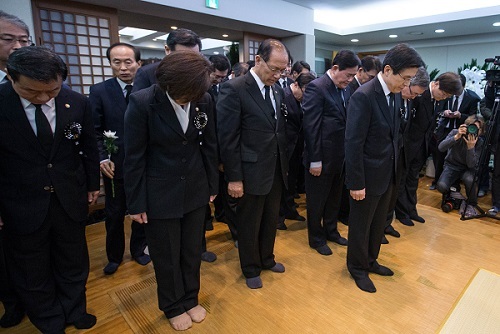Former President Kim Young-sam’s death on Sunday prompted heavyweights across the political spectrum to highlight in unison the significance of South Korea’s transition from dictatorship to democracy.
From conservatives to liberals and bigwigs to rookies, politicians echoed that Kim had left an indelible mark on the nation’s democratic development. Some from the opposition party underscored Kim’s legacy during the Korea’s democratization and urged the Park Geun-hye administration to uphold his values.
Conservative politicians such as former President Lee Myung-bak and former Prime Minister Kim Jong-pil described Kim as “the last figure who protected South Korea’s democracy” and “a political leader with a strong conviction,” respectively.
The main opposition New Politics Alliance for Democracy leader Rep. Moon Jae-in highlighted the political message of Kim’s life, saying, “It is extremely shameful that Kim, who led the nation’s democratic movement, leaves us when the fate of the nation’s democracy is now on the line.”

His death came at a time when a debate is intensifying over the future of Korea’s democracy under the current Park Geun-hye government, which faces mounting criticism at home and abroad for what critics consider to be “antidemocratic” moves, such as its attempt to adopt state-authored textbooks and block rallies.
Kim’s democratic feats were not always as praised by the opposition. Particularly the NPAD lawmakers loyal to Kim’s rival late President Kim Dae-jung had criticized him for merging with a party led by Roh Tae-woo, a general turned president, during the 1992 presidential campaign. Roh had been supported by his predecessor Chun Doo-hwan, who rose to the power with military coup in 1980.
Nevertheless, upon his death, the NPAD joined in praising Kim as an opposition politician who contributed to expel the relics of authoritarian regime. Kim had disbanded a military organization attempting to wield political power by seizing control of the newly aligned ruling party.
Hundreds of people joined the mourning, recalling how Kim’s life epitomized the rocky development of Korea’s modern history.
“Despite his political mistakes, Kim was truly a driving force behind the Korea’s democratic movement. What he had done is all the more meaningful compared to what the Park Geun-hye is doing in terms of democratic value,” said Kim Myeong-sook, 45, a woman from Kim’s hometown of Geojedo Island, South Gyeongsang Province.
The NPAD, meanwhile, plans to reevaluate Kim’s contribution to the opposition’s democratic movement and list him as one of the “key figures” in the party’s democratization movement. NPAD Rep. Chun Byung-hun said in a media interview that Kim was a proud legacy of the opposition parties and a historic figure who its lawmakers should respect.
Other minor opposition parties agreed. “Late President Kim had criticized and found it regretful that democratization that was realized with him and his former colleague late President Kim Dae-jung through their sacrifice and determination were losing its light due to the Park Geun-hye administration’s self-righteousness,” said People’s Justice Party led by Rep. Chun Jung-bae.
By Yeo Jun-suk (jasonyeo@heraldcorp.com)





![[Herald Interview] 'Amid aging population, Korea to invite more young professionals from overseas'](http://res.heraldm.com/phpwas/restmb_idxmake.php?idx=644&simg=/content/image/2024/04/24/20240424050844_0.jpg&u=20240424200058)











![[KH Explains] Korean shipbuilding stocks rally: Real growth or bubble?](http://res.heraldm.com/phpwas/restmb_idxmake.php?idx=652&simg=/content/image/2024/04/25/20240425050656_0.jpg&u=)

